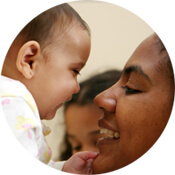
Low-Income Mothers
March 1, 2017
What are the issues?
- Low labour force participation rate for women, compared to other developed countries, despite having more access to education. There are more than 600,000 women outside of the labour force.
- Caregiving, domestic work and family responsibilities still overwhelmingly fall on women. 78% of prime working-age women cite family responsibilities as the main reason for being outside the labour force, compared to 9.6% of men citing the same reasons. According to a survey we ran in 2013, 52% of respondents think that women should take care of household chores and caregiving.
- Significant repercussions on women’s economic well-being in old age when they continue to carry out most of the unpaid work at home
- Not enough formal support for working adults to balance caregiving and paid employment, e.g. lack of accessible childcare facilities or flexible work arrangements.
- Workers face employment discrimination on grounds like gender, reproductive status and others, with little effective recourse.
- Low-income mothers face particular difficulties juggling work and care and bear the brunt of financial instability due to structural barriers accessing stable work and formal childcare.
What changes do we want?
- Recognition of care as a social good which should be publicly and collectively supported, rather than left to the private resources of individual families.
- Gender-equal division of caregiving responsibilities in the family.
- Employment opportunities that are more supportive of caregiving and domestic needs, including more gender-equal parental leave and other accommodations for working caregivers.
- Robust laws and enforcement mechanisms to address workplace discrimination, which are currently lacking.
- Free childcare for those from low-income families.
What are we doing about it?
- The S.H.E. Project, a research-based service that between 2018 and 2021 provided stable and decent housing, alongside transformational support programmes, for 18 low-income single-mother families. We conducted quarterly interviews with the 12 families whose stay spanned six months or longer, tracking progress in housing access, employment, family well-being and other areas. Read our 2022 report “Why Stable Housing Matters”.
- Published a 2018 qualitative study of 47 low-income mothers and their challenges with work and care. Read the report “Why Are You Not Working?” here.
- Working with partners, such as the non-profit Daughters Of Tomorrow (DOT), to address barriers to economic empowerment, and to understand the barriers to employment low-income women face
- Training and certifying low-income women as professional caregivers in the eldercare sector
- Regular communications and advocacy on caregiving, gender equal division of domestic labour, support for mothers, parental leave and workplace discrimination



